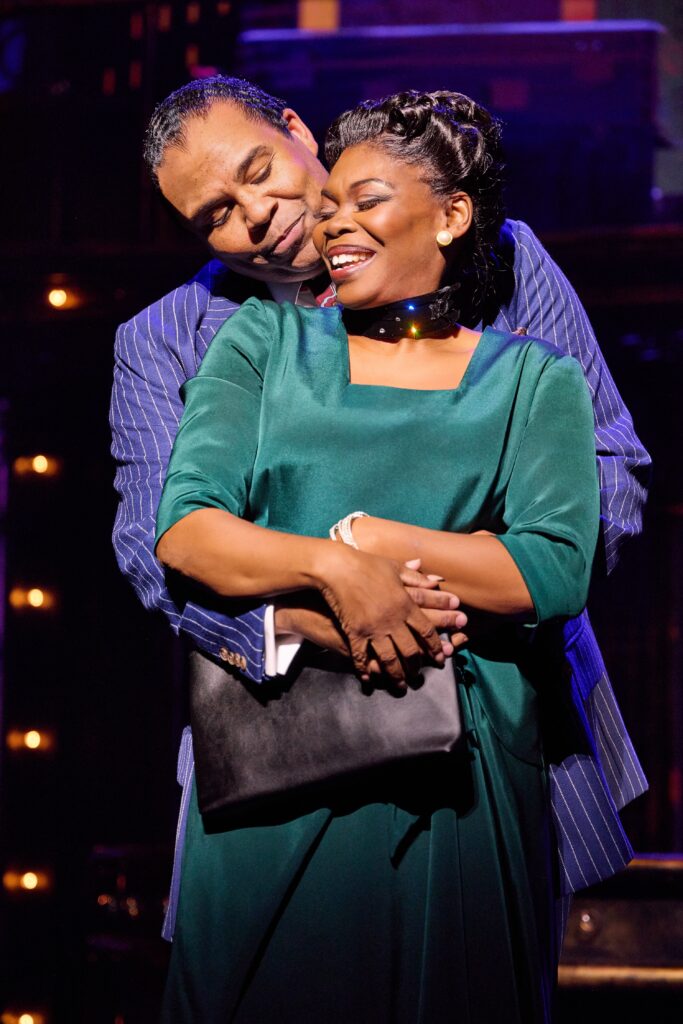In ‘A Wonderful World,’ a Jazz Giant, Louis Armstrong, Comes Across as Smaller Than Life
James Monroe Iglehart, whose sunny charisma would seem naturally suited to portraying Armstrong, is not to blame; the main fault lies, as it often does in jukebox hagiographies, with the book.

James Monroe Iglehart became a Broadway star 10 years ago playing the Genie in the original cast of “Aladdin.” The role, voiced in the Disney animated film by Robin Williams, called for a combination of comedic chops and sheer physical stamina — one production number found him singing while running around the stage for a solid eight minutes. Mr. Iglehart earned Tony and Drama Desk awards for his work.
The performer’s latest assignment would seem to pose an even greater challenge: In “A Wonderful World: The Louis Armstrong Musical,” Mr. Iglehart is cast in the title role, as a man widely recognized as one of the greatest and most influential musicians — or artists of any stripe, for that matter — of the 20th century.
Alas, as depicted in “A Wonderful World,” the late jazz giant comes across as puzzlingly smaller than life, or smaller than Armstrong’s life, at least. Mr. Iglehart, whose sunny charisma would seem naturally suited to the part, is not to blame; the main fault lies, as it often does in jukebox hagiographies, with the book.
Librettist Aurin Squire, whose previous credits include socially conscious docudramas and journalism, has opted to study Armstrong’s career and personal life through two primary lenses. The first is the racism that devastated Black artists and people through the last century; the second, and more consistently prominent, focuses on his four marriages, which in the musical correspond with four different locations central to Armstrong’s journey.
The show opens in Armstrong’s native New Orleans, where he weds Daisy Parker, a sex worker. Pianist Lil Hardin meets Armstrong while they’re playing in Joe “King” Oliver’s band at Chicago, and she becomes his wife and manager. Alpha Smith is the third Mrs. Armstrong, sharing his Hollywood adventures, but it’s with Lucille Wilson, an entertainer at New York’s storied Cotton Club, that he finds lasting stability.

Each of these women is portrayed as both aspirational and devoted to her husband, and each in some way suffers as a result. Lil, played by an elegant Jennie Harney-Fleming — whose bright, brassy singing almost seems modeled at times after Armstrong’s playing — frets over her spouse’s relative lack of ambition, which she attributes to a dearth of confidence. “You have to know how much you’re worth to be happy,” she tells him.
But it’s Lucille, given a sultry voice and a commanding presence in Darlesia Cearcy’s performance, who finally rescues Armstrong in this portrait, putting an end to his womanizing and alerting his new manager, Joe Glaser — a guy remembered as much for his alleged mob connections as the famous musicians he represented, played here with the requisite salt and vinegar by Jimmy Smagula — that she intends to keep an eye on him, and his books.
It’s to be expected that a contemporary show would pay tribute to, and express sympathy for, the women behind a great man. Curiously, though, Mr. Squire seems less interested in, or at least pays less attention to, Armstrong’s own astonishing accomplishments; the emphasis is rather on his personal struggles, not only as a husband, but with drugs, greedy business collaborators, and bigotry.
Certainly, any portrait of Armstrong that didn’t address these factors — particularly the racial discrimination and oppression he had to contend with — would be incomplete. Yet one would think that over the course of its roughly two and a half hours, “A Wonderful World” might have had time to address, say, his key role in the Harlem Renaissance, or in promoting the work of top pop and jazz composers with a unique style that underlined melody while accommodating improvisation.
There are references in the musical to scat singing, of which Armstrong was an early champion, and the Chicago portion details his formative years with Oliver, played as a charming scoundrel by a slick Gavin Gregory. But other significant collaborations are left ignored — Ella Fitzgerald is mentioned, but only briefly and dismissively, by Glaser — and Armstrong’s contributions to Hollywood are reduced to the demeaning parts that led some to view him as an Uncle Tom-like figure.
Mr. Squire hardly encourages this perspective; later in the show, he recounts how Armstrong put his career in jeopardy by denouncing Eisenhower, who was then president. And the music, which ranges from blues classics to pop standards (including, of course, the show tune “Hello, Dolly!”), is savvily orchestrated and arranged by jazz veteran Branford Marsalis, with music supervisor Daryl Waters providing vocal and incidental arrangements and additional orchestrations.
Mr. Iglehart, for his part, manages an impressive impersonation of Armstrong’s distinctly gravelly voice. Yet as is so often the case with shows like this, you’re better off revisiting the artist’s recordings than shelling out money for a simulation of his art — or his remarkable life, for that matter.

